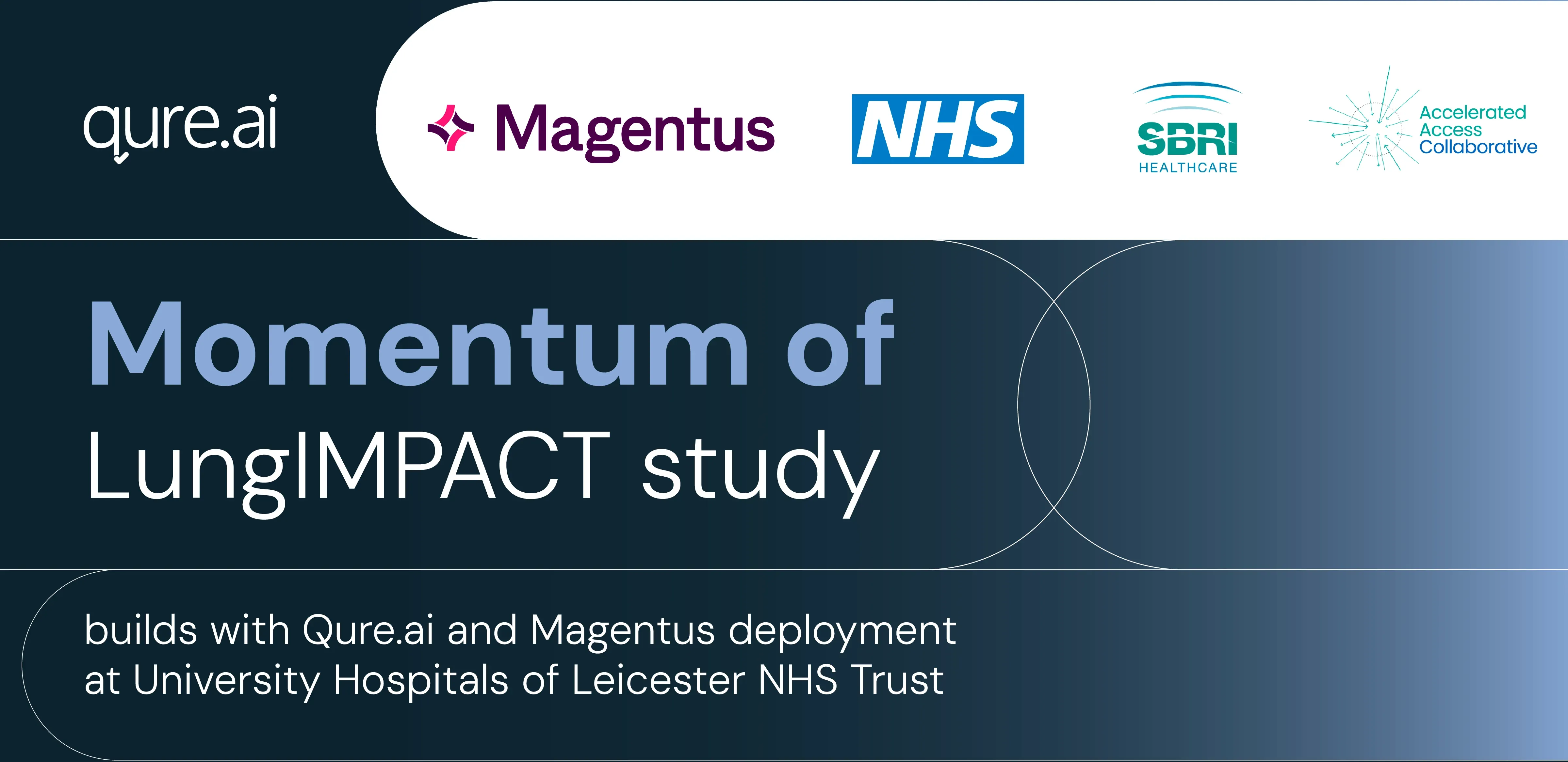Momentum of LungIMPACT study builds with Qure.ai and Magentus deployment
Back
Artificial Intelligence (AI) for the prioritisation of abnormal chest X-rays has successfully gone live at University Hospitals of Leicester NHS Trust. It will review approximately 100-150 GP referred X-rays each day to identify and triage the presence of potential lung abnormalities, providing immediate reporting to clinicians to make next stage decisions on CT referrals or treatment planning.
The AI implementation is part of a multi-NHS site ‘LungIMPACT’ research study to gather real-world evidence of the impact of immediate AI enabled patient triage to chest CT on the lung cancer pathway.
At University Hospitals of Leicester NHS Trust, the project is using Qure.ai’s flagship qXR AI integrating into the Radiology Information System (RIS) from Magentus. This has created a seamless AI install for Leicester’s radiologists, powering productivity and enabling smooth switching between Chest X-ray and CT reporting workflows.
“Approximately a third of all Chest X-rays have some abnormality, a small proportion significant. Qure’s AI enables the rapid segregation of normal and abnormal Chest X-ray results, instantly prioritising the cases that need radiologist reporting review, and for possible referral to next stage CT scans,” states Dr Indrajeet Das, Consultant Cardiothoracic Radiologist at University Hospitals of Leicester NHS Trust. “By working closely with Magentus, the Qure team ensured that the AI meets the needs of the modern radiologist. The configuration enables smooth switching of workflows between Chest X-ray and CT reporting in two simple ‘clicks’, rather than a potential six. This is a huge consideration for productive diagnostic imaging workflow in a busy environment.”
“The LungIMPACT study is a vital part of medical imaging AI’s coming of age, especially to demonstrate the potential opportunities of a digital pathway for early lung cancer detection,” states Darren Stephens, Senior Vice President & Commercial Head UK and Europe of Qure.ai. “The study is focused on gathering real-world evidence on the use of AI in triaging chest X-rays from patients referred from primary care, plus the subsequent time to CT and time to lung cancer diagnosis. We welcome University Hospitals of Leicester NHS Trust as the latest AI-powered site to join the evidence-generating momentum and thank Magentus for its close partnership working on the technical aspects of radiology workflow.”
Christopher Ladds, Acting CEO of Magentus adds, “This project gives clinicians the granular control of their workflows and worklists that they need and makes the most of our powerful RIS solution. Implementing Qure’s qXR AI into RIS at University Hospitals of Leicester NHS Trust and seamless switching between different imaging modality reporting maximises resource utilisation and throughputs. Digital agility in radiology is a collaborative process and we are delighted the system is now live.”
Qure’s qXR AI solution is CE Class IIb per EU MDR certified for the stratification of normal versus abnormal chest X-rays.
The LungIMPACT study was commissioned and funded by the NHS Cancer Programme, with the support of SBRI Healthcare and the NHS Accelerated Access Collaborative. It is jointly led by Professor David Baldwin, Chair of the UK Clinical Expert Group for Lung Cancer and Mesothelioma; National Clinical Lead for Lung Cancer, NHSE; Clinical Advisor to the UK National Screening Committee, Department of Health and Social Care; Respiratory Consultant at Nottingham University Hospitals NHS Trust; and Honorary Professor of Medicine at the University of Nottingham, and Dr Nick Woznitza, a Consultant Radiographer at University College London Hospitals (UCLH) NHS Foundation Trust, and Clinical Academic at Canterbury Christ Church University.
